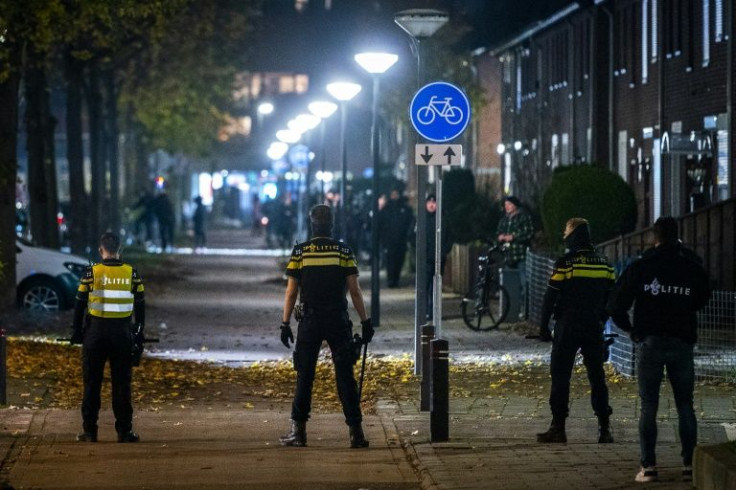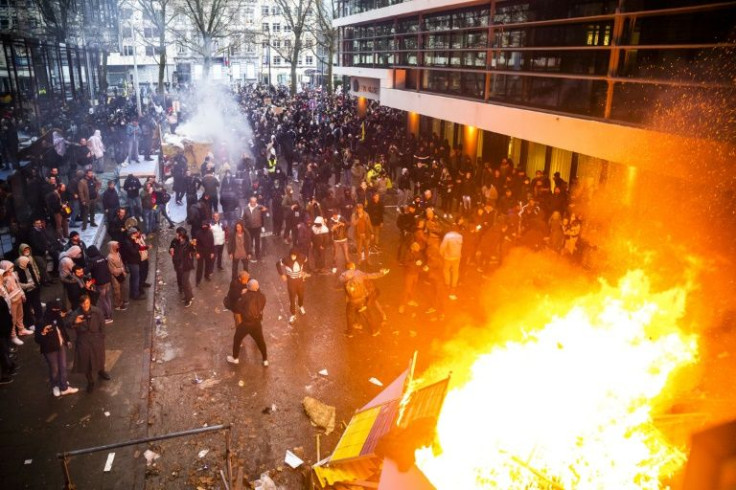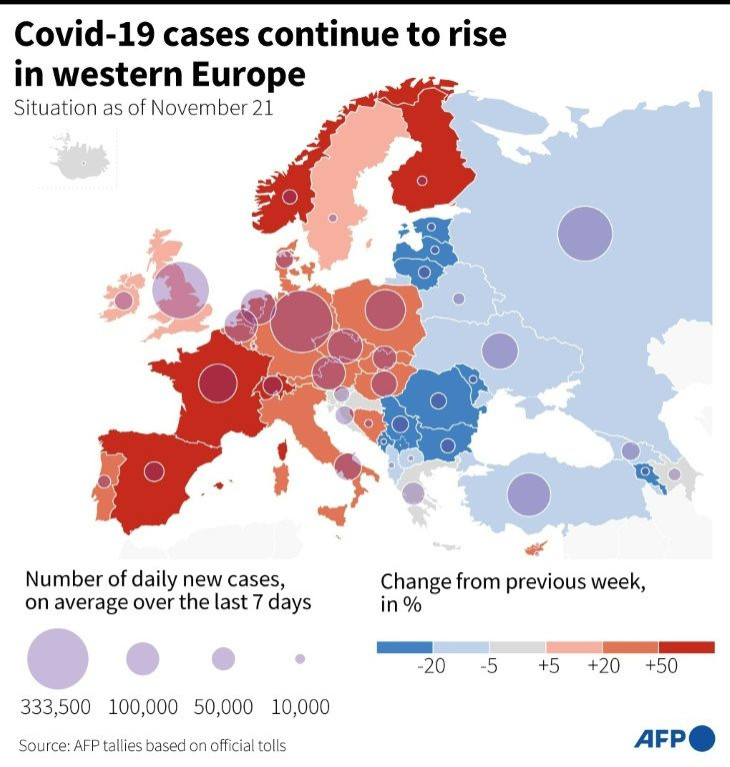'Jabbed, Cured Or Dead', Germany Warns As Europe Battles Covid Surge
Germans faced the stark warning Monday that they would be either "vaccinated, cured or dead" from Covid by the end of winter, while Austria returned to a partial lockdown as Europe battles a fourth wave of the pandemic.
Belgium and the Netherlands meanwhile condemned clashes that rocked weekend protests against new anti-Covid measures, aimed at containing a surge in infections sweeping parts of the continent.
Dutch Prime Minister Mark Rutte slammed three nights of unrest as "pure violence" by "idiots", while his Belgian counterpart Alexander de Croo called the violence at a 35,000-strong protest in Brussels "absolutely unacceptable".

The anger comes amid growing alarm over Europe's return as the pandemic's epicentre, blamed on a sluggish vaccine uptake in some nations, the highly contagious Delta variant and colder weather moving people indoors again.
"Probably by the end of this winter, as is sometimes cynically said, pretty much everyone in Germany will be vaccinated, cured or dead," German Health Minister Jens Spahn said, as he urged more citizens to get the jab.
Outgoing Chancellor Angela Merkel warned that Germany's current Covid curbs -- including barring the unvaccinated from certain public spaces -- "are not enough".
"We have a highly dramatic situation" as new infections "double every 12 days", Merkel told a meeting of leaders of her conservative CDU party, according to participants.

With intensive care beds swiftly filling up, Germany's worst-hit regions have ordered new shutdowns, including the closure of Christmas markets.

The restrictions mirror those in neighbouring Austria, which re-entered a partial lockdown -- shuttering shops, restaurants and festive markets --- from Monday, the most drastic restrictions seen in Western Europe for months.
Its 8.9 million people are not allowed to leave home with few exceptions, such as going to work, shopping for essentials and exercising, as virus cases surge.
The Alpine nation also plans a vaccine mandate from February 1, one of few places in the world to so far to announce such a move.
Austria's schools and kindergartens remain open.

"Look around you, nobody is here," said Anelia Lyotin, manning a stall in Vienna selling nuts and dried fruit.
"This situation now is bad for everyone and the only solution is that everyone gets vaccinated," said the 36-year-old.
Across the border in Slovakia, unvaccinated people were also facing curbs blocking them from entering non-essential stores.

Tens of thousands of demonstrators took to the streets in European cities at the weekend to protest the stricter Covid rules, with anger boiling over in some places.
At least 145 people were arrested in the Netherlands over protests that began in Rotterdam on Friday, sparked by a Covid curfew, and spread to cities across the country. Several police officers were injured.
In Brussels on Sunday, officers fired water cannon and tear gas at a protest police said was attended by 35,000, demonstrating against a ban on the unvaccinated from venues such as restaurants and bars.
In Denmark this weekend, around 1,000 demonstrators protested government plans to reinstate a Covid pass for civil servants.
A crowd of 40,000 marched through Vienna on Saturday decrying "dictatorship", while some 6,000 people protested in the city of Linz on Sunday.
French elite police and counter-terrorism officers arrived in Guadeloupe after a week of unrest over Covid measures, including looting, with President Emmanuel Macron pleading for calm on the French Caribbean island.
The Red Cross said in a report Monday that the pandemic had damaged the "fabric of society".
It said that women and migrants were among the most affected by secondary effects of the crisis such as income loss, food insecurity, reduced protection against violence and worsening mental health issues.
Austria's decision to reimpose a partial lockdown flies in the face of earlier promises that tough virus restrictions would be a thing of the past.
When that proved ineffective, he announced a nationwide lockdown, with an evaluation after 10 days.
In Germany, the EU's most populous nation, just 68 percent of the population is fully jabbed.
The country has urged all vaccinated adults to get a booster jab to combat waning vaccine efficacy after six months -- a call echoed by two French advisory bodies on Monday.
The European Medicines' Agency said it was evaluating an application by Johnson & Johnson to be approved as a top-up shot, having already approved Pfizer-BioNTech and Moderna boosters.
© Copyright AFP 2024. All rights reserved.





















